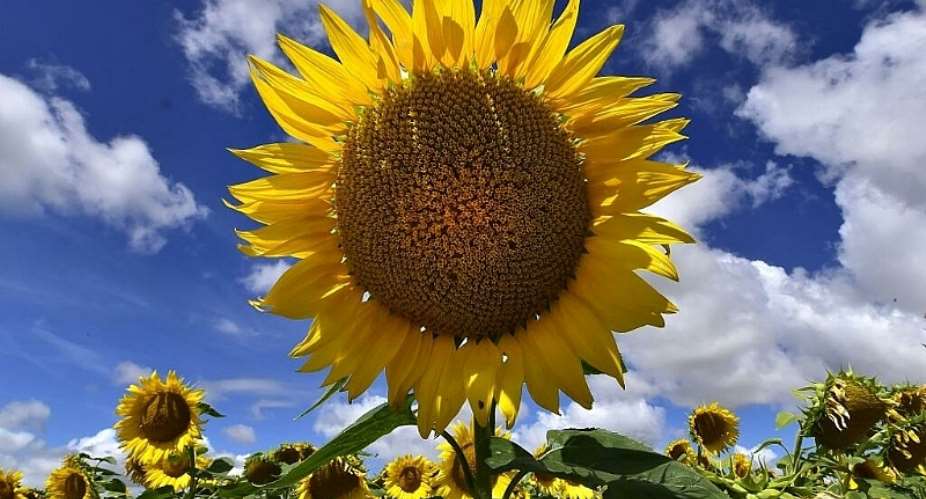An unusually dry period at the beginning of the year has led to water restrictions in 15 departments across France, prompting fears of a drop in winter cereal yields.
France is the European Union's biggest grain producer, and the world's third largest exporter after the US and Russia.
But lower than usual winter rainfall is threatening to reduce crop yields at a time when the war in Ukraine has already disrupted supply chains and kept European prices near record highs.
France's Agriculture Ministry has warned the rainfall shortfall will have a negative impact on this year's production of winter cereals, especially crops such as wheat and barley, which are in the development phase.
"Due to the absence of rain and particularly dry conditions, we know now that there will be an impact – still to be precisely determined – on cereal production," a ministry official said on Monday.
While winter crops can use their roots to draw on moisture, crops in shallow soils were expected to suffer yield losses from dryness, the official said.
"It's a delicate period for cereals," said Joel Limouzin from the FNSEA – France's largest farming union.
France's weather agency, Meteo-France, said on Sunday that rainfall in the first part of this year was down by a third.
"It's a big deficit," hydro-climatologist Florence Habets told RFI.
Meanwhile temperatures in parts of France this week are set to hit 30°C.
If the hot weather continued "there could be up to 40 percent yield loss", warned Limouzin.
No region spared
The area in France worst affected by the drop in rainfall covers a band stretching from the south-east towards Brittany in the north-west.
But "no region is spared" said FNSEA's chief Christiane Lambert.
"With each passing day, we see earth cracking. I just visited a farmer in the Puy-de-Dôme region [in central France] who was irrigating his wheat crop."
If the lack of rain persists, spring crops such as sunflower, beet and maize will also be affected.
January to March was among the 10 driest winter periods on record for some regions in France.
Water restrictions have been placed on 15 of the country's 96 mainland departments – from appeals to be careful through to bans on car washing and watering the garden.
The ministry said agriculture was given priority status, however, as were electricity plants.
Climate crisis
The climate crisis is tending to make winters wetter in France, which then offsets the drier summers. But this did not happen this year.
"It is not necessarily a trend linked to climate change," Habets said, adding it was clear we could expect more droughts in the future.
While France can usually rely on snowfall on its mountain ranges, especially the Alps, to replenish rivers and the water table this year the swow melted quickly, Habets said.
"In the south of the Alps there wasn't much snow so water resources were penalised."
And even if the rainfall returns, it won't compensate for the deficit.
"Summer rainfall doesn't have the same impact as winter rainfall," Habets sais. This is because vegetation that has already developed uses the water for evaporation and doesn't top up the water table or go into the soil.
Switching crops
Five percent of agricultural land in France is irrigated – some 1.4 million hectares – and in the Provence-Alpes-Cote d'Azur in the south-east of France, it's 14 percent.
Wheat, France's main cereal crop, is the second most water-consuming crop after maize.
With the threat of water restrictions, Habets warned farmers may need to choose crops that are less reliant on irrigation.
And as concern grows over grain supplies in the wake of the Ukraine war, it could be time to prioritise cereals that are eaten rather than those that go to making bio fuels.
However Habets conceded it would be complicated for farmers to switch crops quickly.
The government last month announced 100 million euros in additional funding for water agencies to help mitigate the effects of drought.
And following meetings on Monday, the Agriculture Ministry promised an additional 20 million euros to help farmers cope with the effects of climate change.





 Akufo-Addo spotted ordering chiefs to stand for his handshake
Akufo-Addo spotted ordering chiefs to stand for his handshake
 Akufo-Addo ‘disrespects’ every chief in Ghana except Okyenhene — NDC Communicato...
Akufo-Addo ‘disrespects’ every chief in Ghana except Okyenhene — NDC Communicato...
 Supreme Court clears way for dual citizens to hold key public positions
Supreme Court clears way for dual citizens to hold key public positions
 Be transparent, don’t suppress the truth – Prof. Opoku-Agyemang to Jean Mensa
Be transparent, don’t suppress the truth – Prof. Opoku-Agyemang to Jean Mensa
 ‘I won’t tell the world I was only a driver’s mate during challenges’ – Prof Jan...
‘I won’t tell the world I was only a driver’s mate during challenges’ – Prof Jan...
 We’ll prosecute corrupt officials of Akufo-Addo’s govt – Prof Jane Naana
We’ll prosecute corrupt officials of Akufo-Addo’s govt – Prof Jane Naana
 [Full text] Acceptance speech by Prof Jane Naana Opoku-Agyemang as 2024 NDC Runn...
[Full text] Acceptance speech by Prof Jane Naana Opoku-Agyemang as 2024 NDC Runn...
 Election 2024: Don’t be complacent, we haven’t won yet – Asiedu Nketia cautions ...
Election 2024: Don’t be complacent, we haven’t won yet – Asiedu Nketia cautions ...
 Election 2024: Stop fighting over positions in Mahama’s next govt – Asiedu Nketi...
Election 2024: Stop fighting over positions in Mahama’s next govt – Asiedu Nketi...
 Prof Jane Naana Opoku-Agyemang will restore dignity of vice presidency – Fifi Kw...
Prof Jane Naana Opoku-Agyemang will restore dignity of vice presidency – Fifi Kw...
